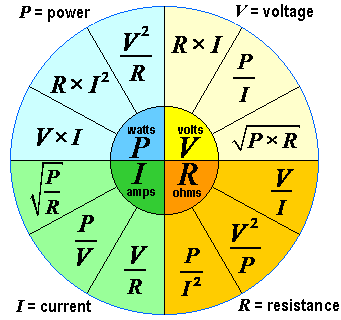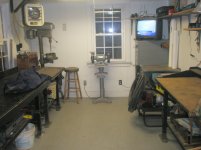LD1
Epic Contributor
Where to begin:confused2:
They would probabally suggest a breaker size in the instructions. But IF it pulls 21A, a 20A breaker is NOT going to be enough. Plus, you size the breaker to the wiring. The machine will pull what it will. I would follow the advise in the directions, but it probabally recomens 30A breaker and 10ga wire minimum.
So to conclude, I also vote for a 220/240 unit. IF you can even find a 5000w 120 unit, the thing would pull about 42A and require a 50A breaker and 6guage wire, and would cost fractionally more to run due to ineffeciencies. VS a 220 heater @ 21A w/10ga wire and a 30A breaker. The cost difference between 50' of 10ga and 6ga is probabally about $50 also.
You are mostly correct, except the first line. Watts does NOT equal ohms times amps times amps:confused2:. Watts is simply volts times amps:thumbsup:The 240V hookup uses half the amperage and since watts equals ohms times amps times amps, using 240V gives you less wattage lost in the wiring to the heater...1/2 the amps and 1/4 the watts. It also reduces voltage drop since volts is amps time ohms...1/2 the amps and 1/2 the voltage drop which means slightly more output from the heater. Using 240V also balances the load on your service, using 120 might add load to the heavier loaded hot leg or it might add load to the lighter loaded hot leg..without an amp meter, you probably won't know. Balanced loads are always better. As far as cost, you pay by the watts used regardless of 120V or 240V so not having the higher watts load in the wire itself would mean you are getting more heat where you want it and less where you don't want it. Without actually doing the math, I'm not sure if using the 240V would save you money overall on your power bill, but it definitely is more efficient! Using 240V might allow you to use a smaller (less expensive) gauge conductor when wiring it up.
WRONGHigher amps (120 volts) = higher electric bill
CORRECTNo, higher amps at 120 is the same electric bill as lower amps at 240. You are paying for watts, not amps. volts times amps equal watts
SPOT ON MAN. 208/220/240 is more efficent at delivering the power where it is needed vs 110/120. Plus a smaller wire can be used.There is a slight savings in using 240 rather than 120. This is due not only to the lower resistive losses in the wiring but also lower internal losses in the equipment. In a resistance heater, this won't make any difference but 220 motors, etc are more efficient than 120v.
I was wondering someone opinion on this one
NEW Soleus Electric 5,000 W Portable Garage Shop Heater | eBay
The amp rating is 21 amps...
would you use a 20 or 30 amp breaker? Never seem 21 usually they will say 20 or 30 amps,as most ads do.
One reason I ask is i have a 20 right now..Figure id use the 20 and see if it blows and then upgrade to the 30.if needed..
Hey Kenney we couldnt even make the switch to METRIC LOL But I like your thought on that
They would probabally suggest a breaker size in the instructions. But IF it pulls 21A, a 20A breaker is NOT going to be enough. Plus, you size the breaker to the wiring. The machine will pull what it will. I would follow the advise in the directions, but it probabally recomens 30A breaker and 10ga wire minimum.
So to conclude, I also vote for a 220/240 unit. IF you can even find a 5000w 120 unit, the thing would pull about 42A and require a 50A breaker and 6guage wire, and would cost fractionally more to run due to ineffeciencies. VS a 220 heater @ 21A w/10ga wire and a 30A breaker. The cost difference between 50' of 10ga and 6ga is probabally about $50 also.



